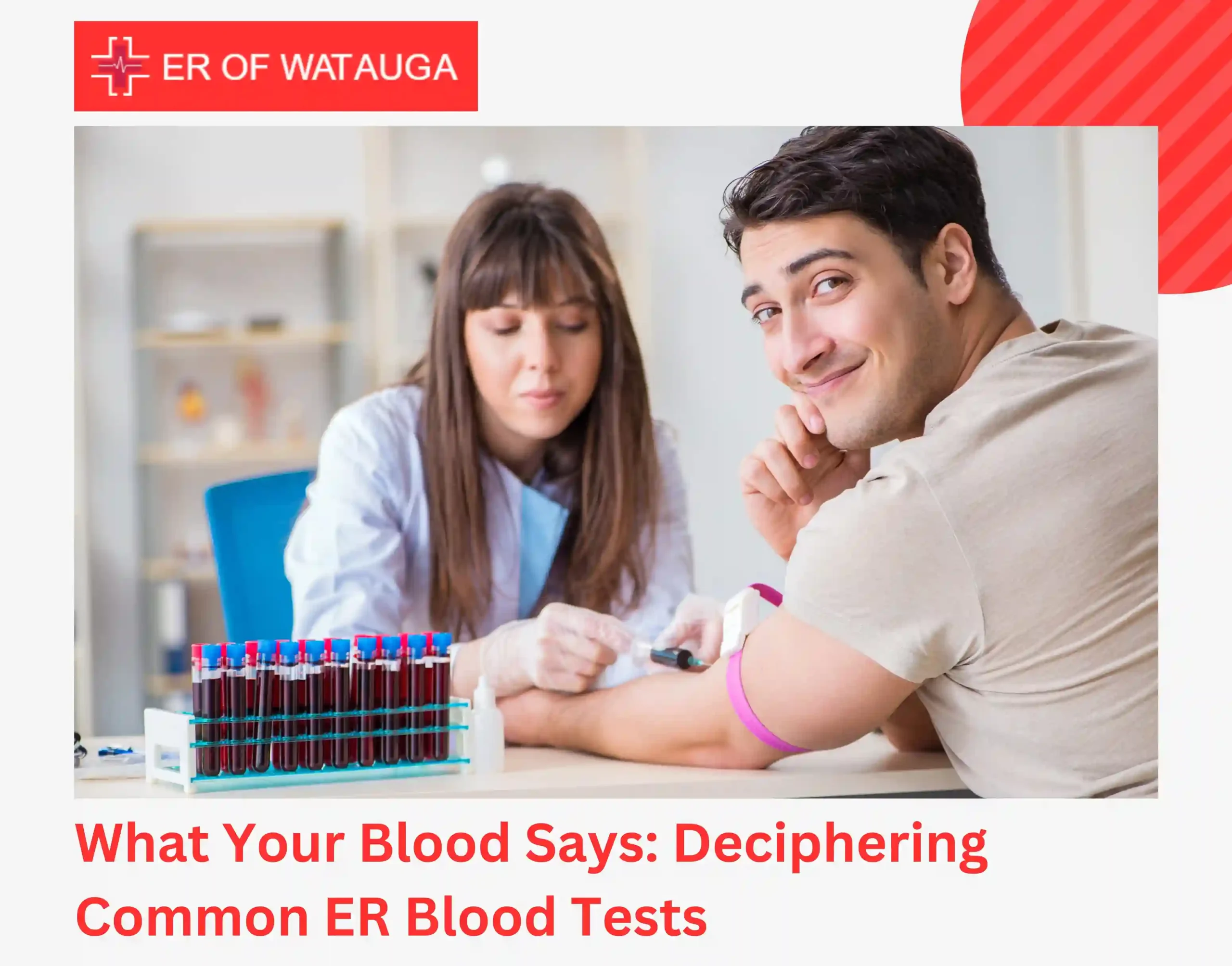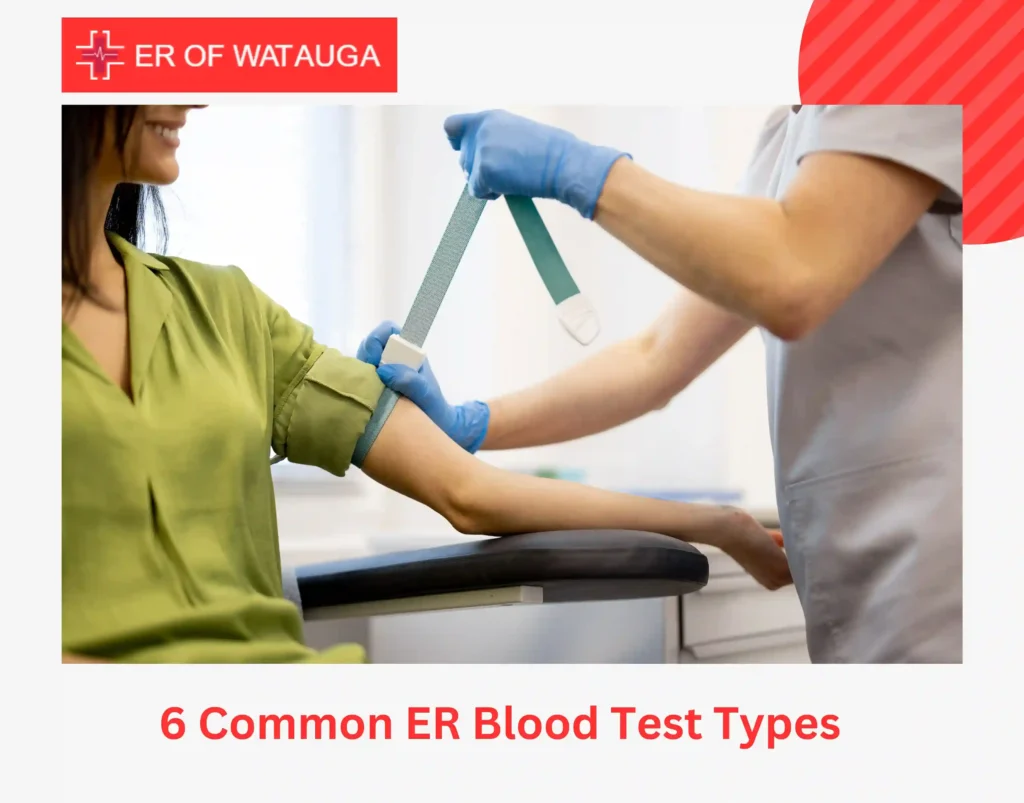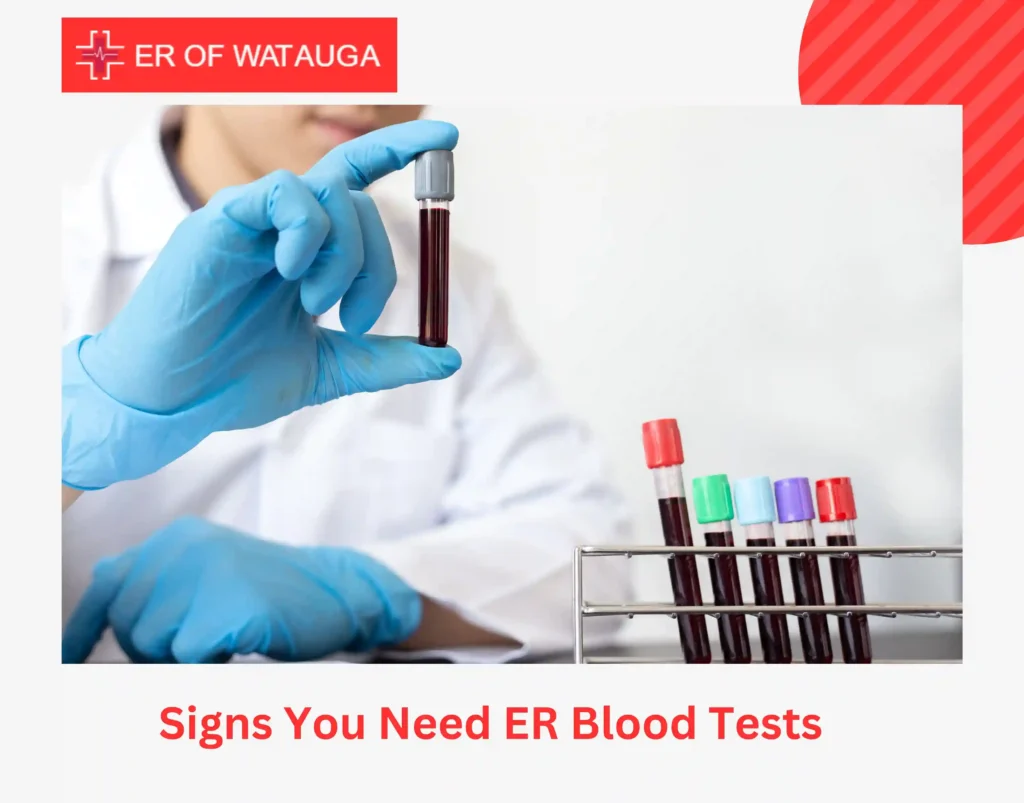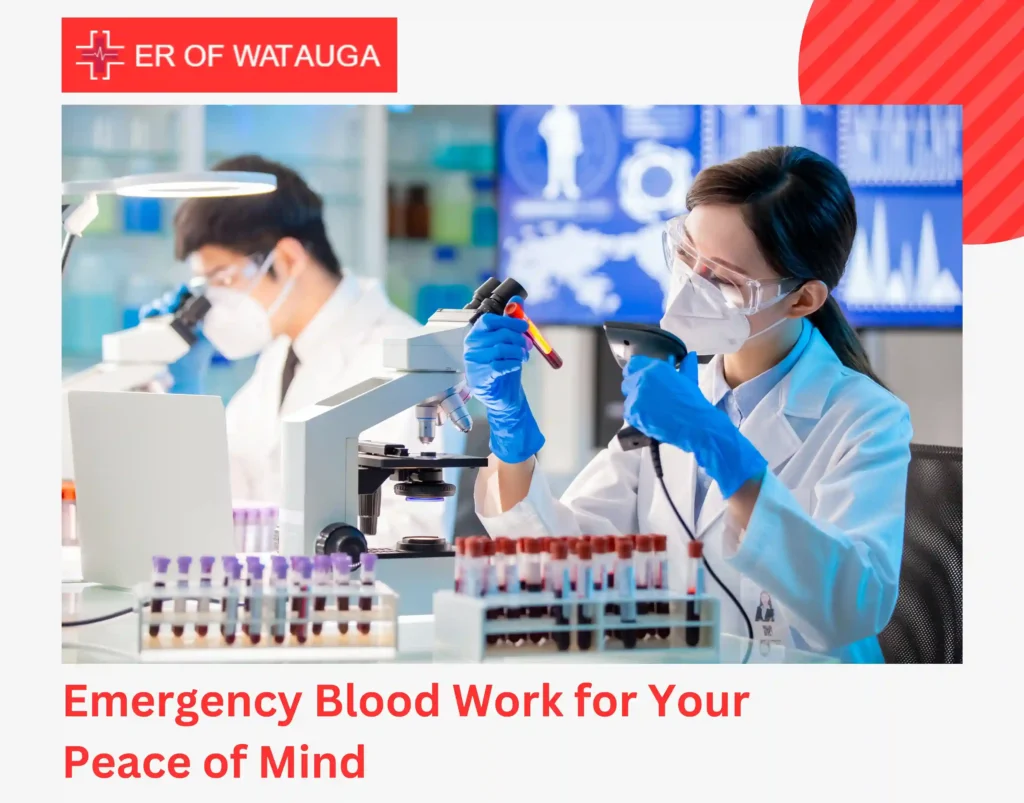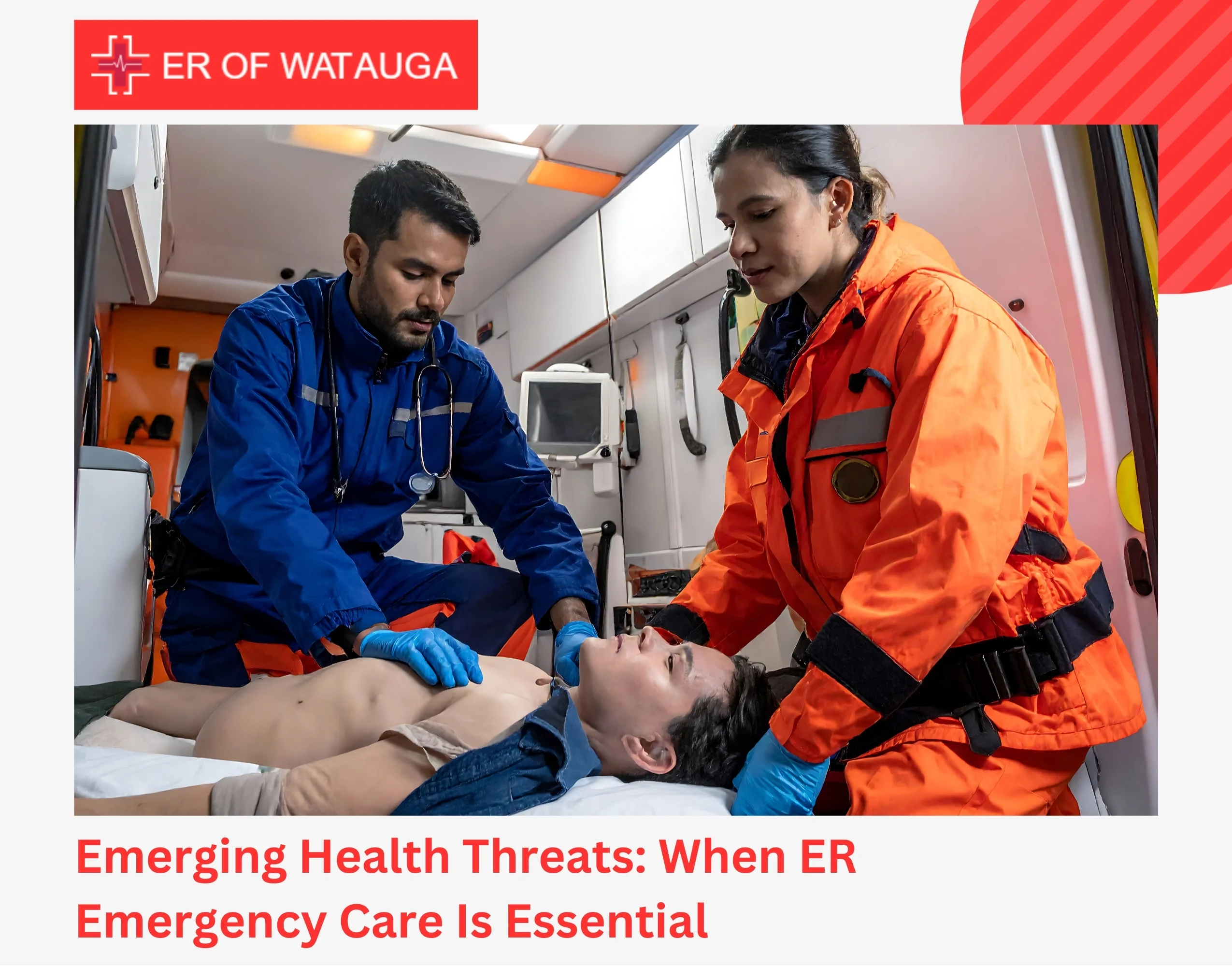Your blood holds vital clues about what’s happening inside your body. In the ER, these clues become particularly crucial as they help us uncover the true cause behind your persistent fever, unexplained dizziness, severe chest pain, or other emergency conditions.
If needles make your hands sweaty or just thinking about blood tests makes you anxious, you’re not alone. Having performed thousands of ER blood tests, we understand your concerns and make every effort to keep you comfortable throughout the process.
Whether you’re concerned about the specific tests we might need, how long you’ll wait for results, or what costs to expect, you deserve clear answers. This guide explores everything about ER blood tests, so you know exactly what to expect when you need emergency blood work.
6 Common ER Blood Test Types
Blood tests have different types for different conditions. Here are some common types:
1. Complete Blood Count (CBC)
A CBC is often our first-line blood test in the ER. This comprehensive test measures essential components of your blood, including:
- Red blood cells: These cells carry oxygen throughout your body. Low levels might explain why you’re feeling weak or dizzy.
- White blood cells: Your body’s defense system against infections and diseases. Elevated levels often indicate your body is fighting an infection or inflammation.
- Platelets: These cells help form blood clots. We check these levels especially if you’re experiencing unusual bruising or bleeding.
- Hemoglobin: This iron-rich protein carries oxygen in your red blood cells. Low levels could explain symptoms like shortness of breath or chest pain.
- Hematocrit: This percentage tells us how much of your blood consists of red blood cells, helping us identify conditions like dehydration or blood loss.
- Mean Corpuscular Volume (MCV): By measuring your red blood cell size, we can identify specific types of anemia and other blood disorders.
We typically order a Complete Blood Count when you come to our ER with symptoms like unexplained fatigue, fever, unusual bleeding, or severe infections. The results help us determine if you need immediate treatment or further testing.
2. Basic Metabolic Panel (BMP)
A BMP measures eight substances in your blood to assess your body’s metabolism, fluid balance, and kidney function. This comprehensive test helps us evaluate your:
- Glucose (Blood Sugar): Abnormal levels might explain symptoms like confusion, extreme thirst, or fainting. High glucose levels could indicate diabetes requiring immediate attention.
- Calcium: Both hypercalcemia (too much calcium) and hypocalcemia (too little calcium) indicate medical emergencies. We monitor these carefully as they affect your heart rhythm and muscle function.
- Sodium: This vital electrolyte affects your blood pressure and fluid balance. Irregular levels might explain symptoms like severe headaches or confusion.
- Potassium: Your heart rhythm depends on proper potassium levels. Whether too high or too low, abnormal levels require immediate treatment to prevent serious complications.
- Carbon Dioxide: Your CO2 levels tell us how well your lungs and kidneys are working together. Abnormal levels might explain breathing difficulties or unusual fatigue.
- Chloride: Changes in chloride levels often signal dehydration or kidney issues. We check these especially if you’re experiencing severe vomiting or diarrhea.
- Blood Urea Nitrogen (BUN): This kidney waste product helps us assess your kidney function, particularly important if you’re experiencing unexplained swelling or decreased urination.
- Creatinine: Along with BUN, creatinine levels give us a clear picture of your kidney health. Elevated levels might indicate your kidneys aren’t filtering waste properly.
We often perform this test when you arrive with symptoms like severe dehydration, confusion, breathing problems, or kidney concerns. The results help us determine the most effective immediate treatment for your condition.
3. Liver Function Tests (LFTs)
Your liver’s health affects your entire body. Liver function tests (LFTs), liver panels, or hepatic panels measure specific enzymes and proteins that tell us how well your liver is working. We typically order these tests to diagnose liver issues like hepatitis or damage from alcohol. If you’re throwing up a lot or your skin looks yellow, LFTs can help figure out what’s going on.
4. Troponin Test
When you arrive at our ER with chest pain, measuring your troponin levels becomes crucial. This protein only appears in your blood when your heart muscle is damaged, making it one of our most reliable indicators of heart problems.
These tests typically look at:
- Troponin I and T: These specific proteins leak into your bloodstream when heart cells are injured
- Timing of Release: Levels start rising within 4-6 hours of heart damage
- Pattern Changes: Healthcare providers often test multiple times to track increasing or decreasing levels
If you experience symptoms like severe chest pain or pressure, pain spreading to your arms or jaw, shortness of breath, or unexplained sweating, you’ll need this test as part of your cardiac evaluation. Fast results help us decode the symptoms of heart disease that need immediate intervention.
5. Blood Cultures
When high fever, severe chills, or signs of a serious infection bring you to the ER, we’ll need to check for harmful microorganisms in your blood. Blood cultures help us identify specific bacteria, yeast, or fungi that might be causing your infection.
Rather than waiting days to identify the infection source, we collect blood samples to quickly detect any dangerous pathogens. This allows us to start you on the most effective antibiotics right away, particularly crucial if you’re experiencing sepsis symptoms or have a weakened immune system.
6. Coagulation Panel
Your blood’s clotting ability requires perfect balance. It needs to clot enough to stop bleeding but not so much that dangerous clots form. A coagulation panel helps us assess this delicate balance by measuring how quickly your blood forms clots.
This test becomes especially important if you’re experiencing unusual bruising or bleeding, or if you’re taking blood thinners. We can quickly determine if your symptoms indicate a clotting disorder or if your blood-thinning medication needs adjustment to prevent dangerous complications.
Signs You Need ER Blood Tests
While blood work is part of routine checkup, you may need emergency blood test if you have:
● Severe Pain or Symptoms
Intense chest pain, severe abdominal discomfort, or extreme fatigue could indicate serious conditions requiring prompt blood analysis.
● Suspected Infection
High fever, persistent chills, or unusual body aches might signal an infection that needs immediate identification and treatment.
● Trauma
After accidents or injuries, blood tests help us assess internal damage and overcome traumatic injuries.
● Changes in Mental State
Sudden confusion or extreme drowsiness might signal dehydration, electrolyte imbalances or other serious issues detectable through blood tests.
● Breathing Problems
Rapid or difficulty breathing, especially with chest pain, could indicate conditions requiring urgent blood work.
● Unexplained Symptoms
Sudden weight loss, unusual bruising, or fatigue could indicate underlying conditions requiring immediate investigation.
Don’t wait if you experience these symptoms. Early detection through blood tests can prevent long term complications.
How Long Do Blood Tests Take in the ER?
Waiting for test results can be stressful. While drawing your blood only takes about five minutes, the processing time varies based on the specific tests needed and your condition’s urgency. Here are the typical result times.
● Routine Emergency Tests (CBC, Basic Metabolic Panel)
Results typically available in 15-40 minutes, helping us quickly assess your overall health status.
● Cardiac Tests (Troponin)
Usually ready within an hour, crucial for diagnosing heart attacks and other cardiac emergencies.
● Complex Tests (Blood Cultures)
May take 24-48 hours for complete results, though we often receive preliminary findings much sooner.
We prioritize testing based on medical urgency. For life-threatening conditions, our on-site clinical laboratory fast-tracks your ER blood test results to ensure you receive immediate care.
How Much Do ER Blood Tests Cost?
ER blood tests costs vary based on the type and number of tests needed. But emergency blood work shouldn’t be delayed by cost concerns. While basic screening tests typically range from less than $100 to a few hundred dollars, comprehensive panels that include multiple tests may have higher costs.
We accept all personal insurance plans, which often reduce your out-of-pocket expenses to your plan’s standard emergency care copay. At our Watauga facility, we’ll also help you understand your coverage and explore payment options that work for you.
Reading Your ER Blood Test Results
When you receive your ER blood test results, you’ll see your values, next to a normal range, also called a reference range. If your results are outside that range—higher or lower—it could point to an underlying condition. But context matters:
- Your age, gender, and overall health affect what’s “normal” for you
- Some medications can influence test results
- Even healthy individuals occasionally show results outside standard ranges
Our emergency physicians carefully evaluate your complete health picture, not just individual numbers. We’ll explain your results in clear terms and answer any questions you have – because understanding your health is your right.
Emergency Blood Work for Your Peace of Mind
ER blood tests are crucial diagnostic tools that help us uncover what’s causing your symptoms. The whole process might seem intimidating, but without these tests, health problems could stay hidden and turn into serious problems down the line.
Next time you hear, “We’ll need to do some blood tests,” remember it’s a step toward getting you better, faster. Our experienced team at Watauga emergency room is here to make the process as comfortable as possible while getting you the answers – and relief – you need.
FAQs
1. Does ER blood test show cancer?
Some blood tests can reveal abnormalities that hint at cancer (like high white blood cell counts or tumor markers), but they’re not designed to diagnose it. Confirmation requires follow-up tests with a specialist.
2. Do ER blood tests need any preparation?
Not usually. But some tests, like checking your blood sugar or cholesterol, may need fasting. If specific guidelines are necessary for your blood test, the ER staff will inform you.
